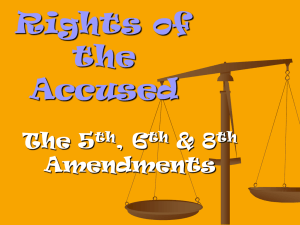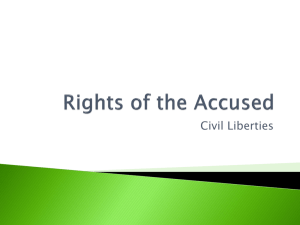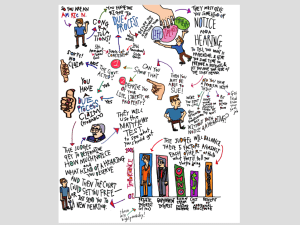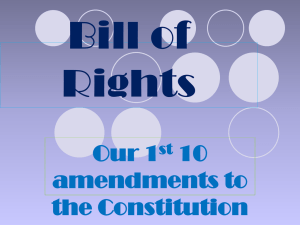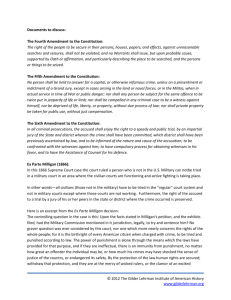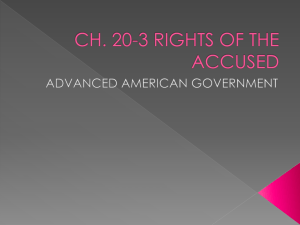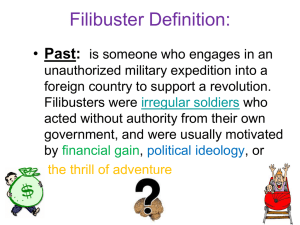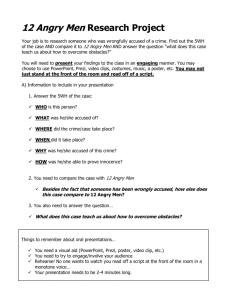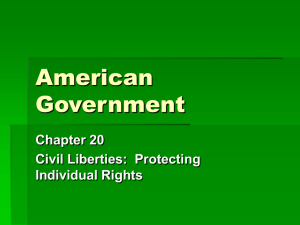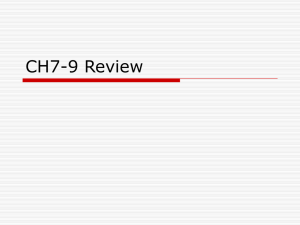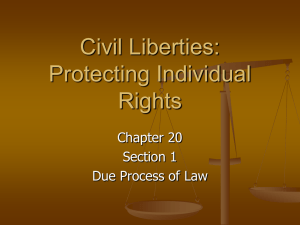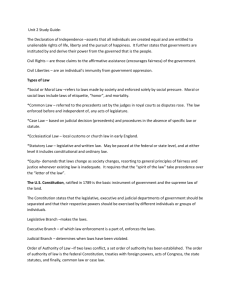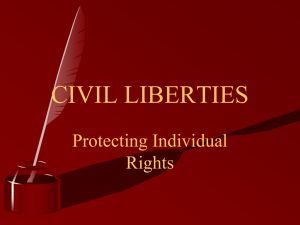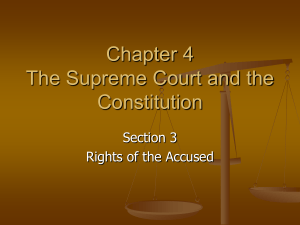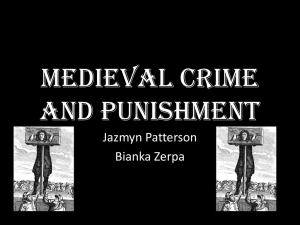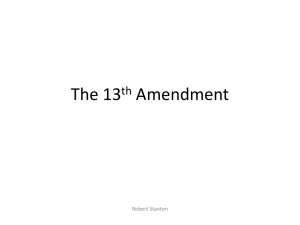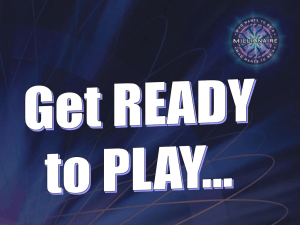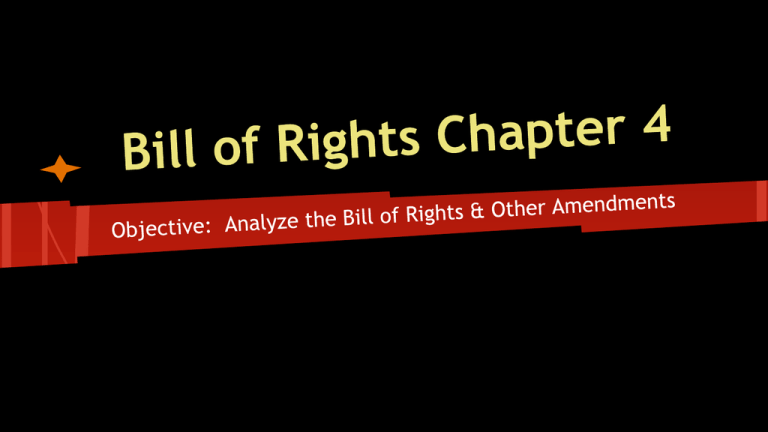
An individual’s
rights must be
balanced with the
rights of others
and the
community’s
health and safety.
Community vs. Individual Rights
When there is a conflict, the rights of the community often come first.
The Bill of Rights protects our civil liberties-the freedoms we have to think and to act
without government interference or fear of
unfair treatment.
Freedom of religion
Freedom of speech
Freedom of the press
Freedom of assembly
I do not agree with
what you have to
say, but I’ll defend
to death your right
to say it. Voltaire
Freedom of association
Freedom to petition the government
Petition=formal request; right to express one’s ideas to the government
Freedom of speech does not
include the right to
endanger our government
or other American citizens.
You do not have freedom to
provoke a riot. You are not
free to speak or write in a
way that immediately leads
to criminal activities or
efforts to otherthrow the
government by force.
Slander=Spreading spoken
lies is a crime
Libel=Spreading
written/printed lies is a
crime
The right to bear arms
Fourth Amendment-protects Americans
against unreasonable searches and
seizures.
Search Warrant-a court order allowing law
enforcement officers to search a suspect’s
home or business and take specific items
as evidence
A drug-sniffing dog and police officer search lockers.
Every person is
No trial may be Fifth Amendment
entitled to due
held unless a
Miranda-Right to remain silent
process of law.
person is formally Accused persons may
Due processcharged, or
not be forced to testify
means following
No
one
may be legal
Eminent
domain
is
indicted, by the
established
against themselves.
deprived
of theirthe
the right of the
procedures;
grand jury.
government to take
laws
property
bythemselves
the
property-A person found notprivate
guilty
Double Jeopardy-this means
that people
must be
Indictment-a formal charge by a
government
usually
land--for
who are accused
of a crime
andwithout
judged not
reasonable
may
not
be
put
on
trial
group of citizens called a grand
compensation.
public use. guilty may not be
put on trial again for the
jury,
who
review
the
evidence
again for the same crime. same crime.
against the accused
Sixth Amendment The accused must be
The accused
permitted to hear and
must be informed
question all witnesses.
If possible, the
of the nature of
trial must be held
the charges.
in the area where The accused is entitled to
The accused must
a lawyer and to call
the crime took
be allowed a
witnesses for his or her
place.
speedy and public
defense.
trial by an impartial It also requires that the accused be
jury.
allowed a trial by jury although they
may ask to be tried by only a judge
Eighth
Forbids excessive bail
Amendment Forbids cruel and
unusual punishment
Bail is a sum of money
Debated for years what
used as a security
kinds of punishment are
Bail can be denied-flight
deposit.
cruelagreed
and unusual
Generally
that
risk Protects against
punishment should be in
excessive fines if
proportion, or balanced,
Fines vary depending on
convicted
to the crime committed
seriousness of the crime
In peacetime, soldiers may not move into
private homes without the consent of the
homeowner.
***Concerns civil cases-lawsuits that involve, or contain,
disagreements between people rather than crimes.
**Provides the right to a jury trial in federal courts to
settle all disputes about property worth more than $20.
*When both parties in a conflict agree agree, however,
a judge rather than a jury may hear evidence and
settle the case.
States that all other rights not spelled out in
the Constitution are retained by the people.
**States that any powers the Constitution
does not specifically give to the national
government are reserved for the states and
for the people. [Source of Reserved Powers]
*Expresses the idea that the federal
government is limited only to powers it is
granted in the Constitution.
Places limits on suits against states.
Revises procedures for electing president
and vice president [Top two vs. Ticket]
Civil War Amendment
Abolishes slavery
Outlawed any sort
of forced labor,
except as
punishment for a
crime.
Civil War Amendment
Defines United States citizenship; guarantees all citizens
equal protection of the laws
Born or naturalized in the United States
Civil War Amendment
Prohibits restrictions on the rights to vote based on race and color
Suffrage=the right to vote
Women still NOT allowed to vote
Gives Congress the power to levy an income
tax.
Raise revenue
Enables voters to elect senators directly
Previously the state legislatures were to
choose members of the Senate.
18th: Prohibits making, drinking, or selling
alcoholic beverages [Prohibition]
21st: Repeals Prohibition [18th Amendment]
Gives women the right to vote (1920)
Some territories like Wyoming (1869) gave
women the right to vote
Changes the dates of congressional and
presidential terms
Limits presidents to two terms in office
(1951)
In response to FDR’s four terms
Gives residents of the District of Columbia
the right to vote-national elections i.e.
president and vice president
Abolishes poll taxes (1964)
Poll taxes=required votes to pay a sum of
money before casting a ballot
Poor people affected
Establishes procedures for succession to the
presidency
Sets voting age at 18 years
Vietnam War
1971
Delays congressional pay raises until the
term following their passage (1992)
Discrimination=unfair treatment based on
prejudice against a certain group.
Jim Crow Laws-Southern states passed laws
requiring African Americans and whites to
be separated in most public places
Segregation=social separation of the races
Civil Rights=rights of full citizenship and
equality under the law
Supreme Court ruled racial segregation in
public schools was unconstitutional. (1954)
Violated the 14th Amendment-equal
protection under the law. (1868)
Prohibited discrimination in public facilities,
employment, education, and voter
registration.
It banned discrimination based on race and
color, sex or gender, religion, and national
orgina.
Other groups have made gains
Affirmative Action-federal government programs to try
to make up past discrimination.
These programs encouraged the hiring and promoting of
minorities and women in fields that were traditionally
closed to them. Colleges, too, practiced affirmative
action to help minority students gain admission.
Affirmative Action from the start has been
controversial. [Reverse Discrimination???]
Supreme Court struck down a University of
Michigan point-based admission policy,
stating that it gave excessive points to
minority applicants.
Struggle for equal rights continues--each
year the federal government receives more
than 75,000 complaints of workplace
discrimination.
Many Americans and others are sometimes
subject to racial profiling by law
enforcement officers--being singled out as
suspects because of the way they look.
Some Americans even become the victims of
hate crimes--acts of violence based on a
person’s race, color, national origin, gender,
or disability.

